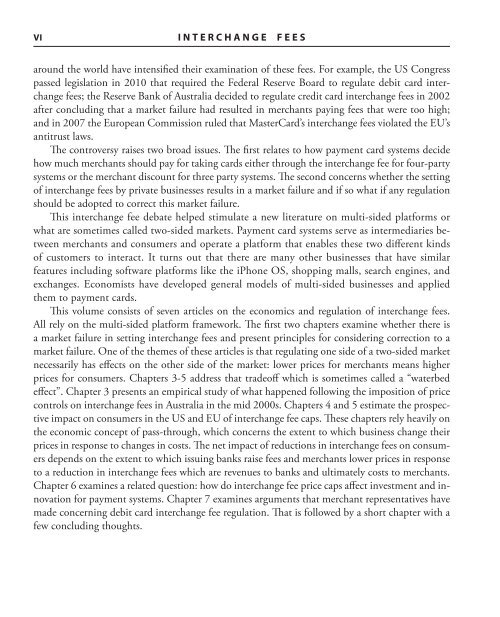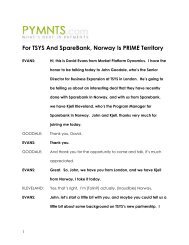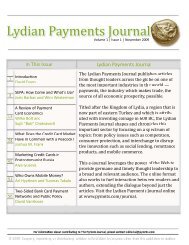Interchange Fees: The Economics and Regulations of What
Interchange Fees: The Economics and Regulations of What
Interchange Fees: The Economics and Regulations of What
- No tags were found...
You also want an ePaper? Increase the reach of your titles
YUMPU automatically turns print PDFs into web optimized ePapers that Google loves.
vi INTERCHANGE FEESaround the world have intensified their examination <strong>of</strong> these fees. For example, the US Congresspassed legislation in 2010 that required the Federal Reserve Board to regulate debit card interchangefees; the Reserve Bank <strong>of</strong> Australia decided to regulate credit card interchange fees in 2002after concluding that a market failure had resulted in merchants paying fees that were too high;<strong>and</strong> in 2007 the European Commission ruled that MasterCard’s interchange fees violated the EU’santitrust laws.<strong>The</strong> controversy raises two broad issues. <strong>The</strong> first relates to how payment card systems decidehow much merchants should pay for taking cards either through the interchange fee for four-partysystems or the merchant discount for three party systems. <strong>The</strong> second concerns whether the setting<strong>of</strong> interchange fees by private businesses results in a market failure <strong>and</strong> if so what if any regulationshould be adopted to correct this market failure.This interchange fee debate helped stimulate a new literature on multi-sided platforms orwhat are sometimes called two-sided markets. Payment card systems serve as intermediaries betweenmerchants <strong>and</strong> consumers <strong>and</strong> operate a platform that enables these two different kinds<strong>of</strong> customers to interact. It turns out that there are many other businesses that have similarfeatures including s<strong>of</strong>tware platforms like the iPhone OS, shopping malls, search engines, <strong>and</strong>exchanges. Economists have developed general models <strong>of</strong> multi-sided businesses <strong>and</strong> appliedthem to payment cards.This volume consists <strong>of</strong> seven articles on the economics <strong>and</strong> regulation <strong>of</strong> interchange fees.All rely on the multi-sided platform framework. <strong>The</strong> first two chapters examine whether there isa market failure in setting interchange fees <strong>and</strong> present principles for considering correction to amarket failure. One <strong>of</strong> the themes <strong>of</strong> these articles is that regulating one side <strong>of</strong> a two-sided marketnecessarily has effects on the other side <strong>of</strong> the market: lower prices for merchants means higherprices for consumers. Chapters 3-5 address that trade<strong>of</strong>f which is sometimes called a “waterbedeffect”. Chapter 3 presents an empirical study <strong>of</strong> what happened following the imposition <strong>of</strong> pricecontrols on interchange fees in Australia in the mid 2000s. Chapters 4 <strong>and</strong> 5 estimate the prospectiveimpact on consumers in the US <strong>and</strong> EU <strong>of</strong> interchange fee caps. <strong>The</strong>se chapters rely heavily onthe economic concept <strong>of</strong> pass-through, which concerns the extent to which business change theirprices in response to changes in costs. <strong>The</strong> net impact <strong>of</strong> reductions in interchange fees on consumersdepends on the extent to which issuing banks raise fees <strong>and</strong> merchants lower prices in responseto a reduction in interchange fees which are revenues to banks <strong>and</strong> ultimately costs to merchants.Chapter 6 examines a related question: how do interchange fee price caps affect investment <strong>and</strong> innovationfor payment systems. Chapter 7 examines arguments that merchant representatives havemade concerning debit card interchange fee regulation. That is followed by a short chapter with afew concluding thoughts.








